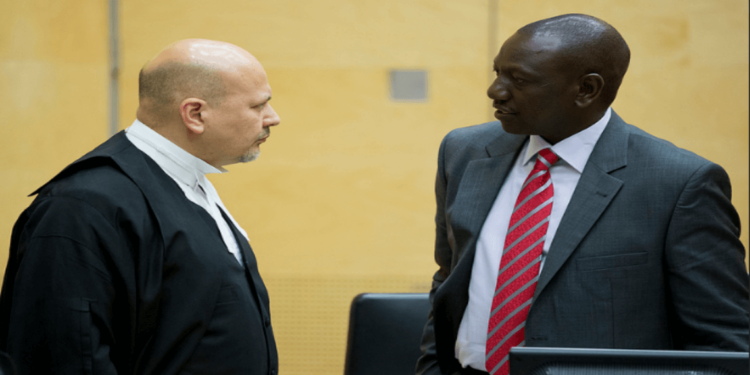By Susan Kendi
A recent document dump by the International Criminal Court (ICC) is offering some rare insights into the extraordinary steps taken by the Court to protect witnesses in the collapsed case against Deputy President William Ruto and journalist Joshua Sang. Almost two years since the ICC abandoned its prosecution of the pair, Journalists for Justice (JFJ) has painstakingly pored through the documents released by the Office of the Prosecutor (OTP) to sieve out the gems. This is the first of a series of articles that will piece together the disparate shards of information from the ICC document dump to tell you the story of the enormous challenges faced by the prosecutor in the Ruto/Sang case and how they eventually led to the case’s discontinuation.
In today’s piece, how the Trial Chamber in the Ruto and Sang allowed the Prosecutor to temporarily withhold the disclosure of evidence of a witness feared to have been abducted:
On 20th May 2014, the International Criminal Court (ICC) Trial Chamber V (A) allowed the prosecution in the William Samoei Ruto and Joshua Arap Sang case to withhold evidence from disclosure to the defence until the security situation of a witness (P-0397) had been assured. The Prosecutor had made the request on the grounds that “there was an objectively justifiable risk to the witness’s safety on account of his alleged abduction” and that only delayed disclosure could “mitigate” the risk of the witness being exposed to any further harm .
The admission by Chief Prosecutor Fatou Bensouda’s office that she feared that the witness had been abducted is no small matter. Neither are the precautions she took to buy the witness time in the hands of possible abductors. The unfortunate saga of Meshack Yebei’s disappearance, torture and death is a ready reminder of the risks faced by individuals thought to have been cooperating with the prosecutor’s office.
Trial Chamber V (A) judges, Judge Chile Eboe-Osuji (Presiding), Judge Olga Herrera Carbuccia and Judge Robert Fremr responded favorably to the prosecutor’s request, The Court, established that it is satisfied with the information before it that further delay of disclosing the evidence is justified and that the witness’s security situation has progressed to a point where there is still existence of an objectively justifiable risk to the witness’s safety and revealing the material may increase that risk.
While delivering the decision on the second application on Witness’s P-0397 security, the court maintained that the circumstances resulting to the finding especially on the unavailability of the witness regardless the issuing of the order to appear before the Court has remained the same.
In its First Decision on the “Prosecution Application for Delayed Disclosure of material related to Witness P-0397”delivered on April 16, 2014, the Trial Chamber V (A) found that given the unlikelihood of Witness P-0397 testifying in the near future, a temporary delay in revealing the evidence to the Defence would have a slight influence in the rights of the accused in terms of preparation for the witness’s testimony. The Court granted the prosecution’s request to withhold the evidence until May 1, 2014 without influencing the possibility of the application renewal in case the Witness’s security situation is not handled.
The prosecution filed a second application on the Witness P-0397 security matter updating the Court on the developments of the matter regarding its investigations on the alleged disappearance of the witness and renewing its prior request to withhold the evidence until the witness location can be established and his security can be assured insisting that the “high risk of harm to the witness still ‘remains unchanged.’
The prosecution argued that the life of the witness was endangered and that since there was no potential of Witness P-0397 imminently testifying, there would be a minimal effect to the Defence case. They added that once the witness’ security and his attendance had been assured, it would reveal the material withheld prior to the witness’ testimony so as to give the Defence enough time to prepare.
In the second decision, the Court maintained its decision and found it essential to review its decision from time to time as the prosecution updates the Court on any new developments on Witness P-0397 security decision.
This episode provides a rare parting of the curtains. The public rarely gets to see the various things ICC judges have to weigh to ensure that trials proceed without causing harm or violating anyone’s rights. In this instance, for the purposes of balancing the trial rights of the accused with the security interests of witnesses and victims, the Court requested the prosecution to prove that there was a justifiable risk of disclosing the evidence to the Defence, that the risk could be controlled by delayed disclosure, that was there is no likelihood of lesser restrictive measures and that the delayed disclosure of the evidence would not harm the rights of the accused and delivery of a fair and impartial trial.
To keep abreast of the situation regarding the witness’ safety, the judges ordered “the Prosecution to provide an update on Witness 397’s security situation every 60 days, commencing on 1 June 2014, or at any point in which a new development arises.”







